
- Elkanah (the husband): he was devout. Even during a time when many of his neighbors were in rebellion against God, he was faithful. 1 Chronicles tells us that his family lineage was that of a Levite (the priestly line). However, there is no mention of him serving in the temple in any official capactiy. Most likely, he was a common man (just like us) . V. 3 says that he went to worship and sacrifice at Shiloh yearly and that this continued to be his custom. He brought his offerings even though the priests Hophnis and Phinehas who received the offering were corrupt (1 Samuel 2:12-17, 22). However, he was not perfect. He had married two wives. In his commentary, Matthew Henry writes, " Thus are men often beaten with rods of their own making." I think Elkanah found this statement to be true.
- Hannah: likely Elkanah's first wife. She was blessed in that Elkanah loved her. (V.5) However, this blessing wasn't enough. She, like most of us, focused less on her blessings and more on what she lacked... children. Make a list of blessings God has given you. Post it in a place that you will see it during the week. Take time to thank God for your blessings!
- Peninnah: Elkanah's second wife. She was blessed with many children. However, instead of this blessing leading to compassion and thankfulness, she became haughty and insolent. She began lording her fertility over Hannah "to irritate her" (v. 6). She wanted to inflict pain. Her actions intensified whenever Hannah went up to the house of the Lord (v.7). Think of people that you know are suffering some type of pain or loss. Do something today to help show compassion toward them.
B. The problem: Hannah is barren and becomes so distraught that she allows her lack of fertility to become the overriding concern in her life. She is incapacitated by her grief (v.7) to the point that she weeps and will not eat. This occurred at a time when she should have been worshipful (she had gone up to the house of the Lord to give her offering). Contrast this to Paul's response last week during the midst of the storm. He stood in chains, encouraging his captors, and offering prayers of thanksgiving to God.
C. The solution: First, Elkanah played a role in helping. He knew that his wife's barrenness was troublesome to her. Therefore, he gave her a double portion (v.5). He was assuring her of her value to him. Even though she was not perfect, with this gift he was telling her that it did not matter. He loved her anyway. He did not wait for her to ask. He simply acted. He also provided encouragement when she was in her deepest time of despair. He lovingly, with empathy, inquired about her pain. He did not condemn her but does remind her of her blessing (v. 8). None of us have perfect spouses. However, we need to take steps to assure them that we love them and will stand by them no matter what. This is how we demonstrate unconditional love. Second, Hannah stands up and in a moment of true worship, prays for help. Her prayer is deeply sincere but simple (V.10-11). She has a sense of grief as she prays. We also need a sense of grief in order to pray effectively. James tells us that we should grieve, mourn, and wail over our sin. Jesus instructs us in the Lord's prayer to ask for forgiveness for our sin. If we are to find help with our troubles, we must deal with the sin in our life and trust God with the rest of the plan. This is exactly what Hannah did. (v.10-11).




No comments:
Post a Comment